Wills, Probate Act & Estate Administration: Family Provision Claims
VerifiedAdded on 2023/04/07
|10
|2322
|100
Essay
AI Summary
This essay provides a detailed analysis of wills and estate administration, focusing on the Probate Act 1958 (Vic) and the impact of the Justice Legislation Amendment Act 2014. It examines the eligibility criteria for family provision claims, highlighting key amendments that restrict the class of plaintiffs and the requirements for establishing a deceased person's duty to provide support. The essay also discusses the law of intestate succession, the process for appointing administrators, and the court's role in determining family provision orders. Case law, including Birmelow v Alampi, is used to illustrate the application of these legal principles. The essay concludes by emphasizing the balance between testamentary freedom and the responsibility towards family members, while referencing the availability of additional resources and solved assignments on Desklib.
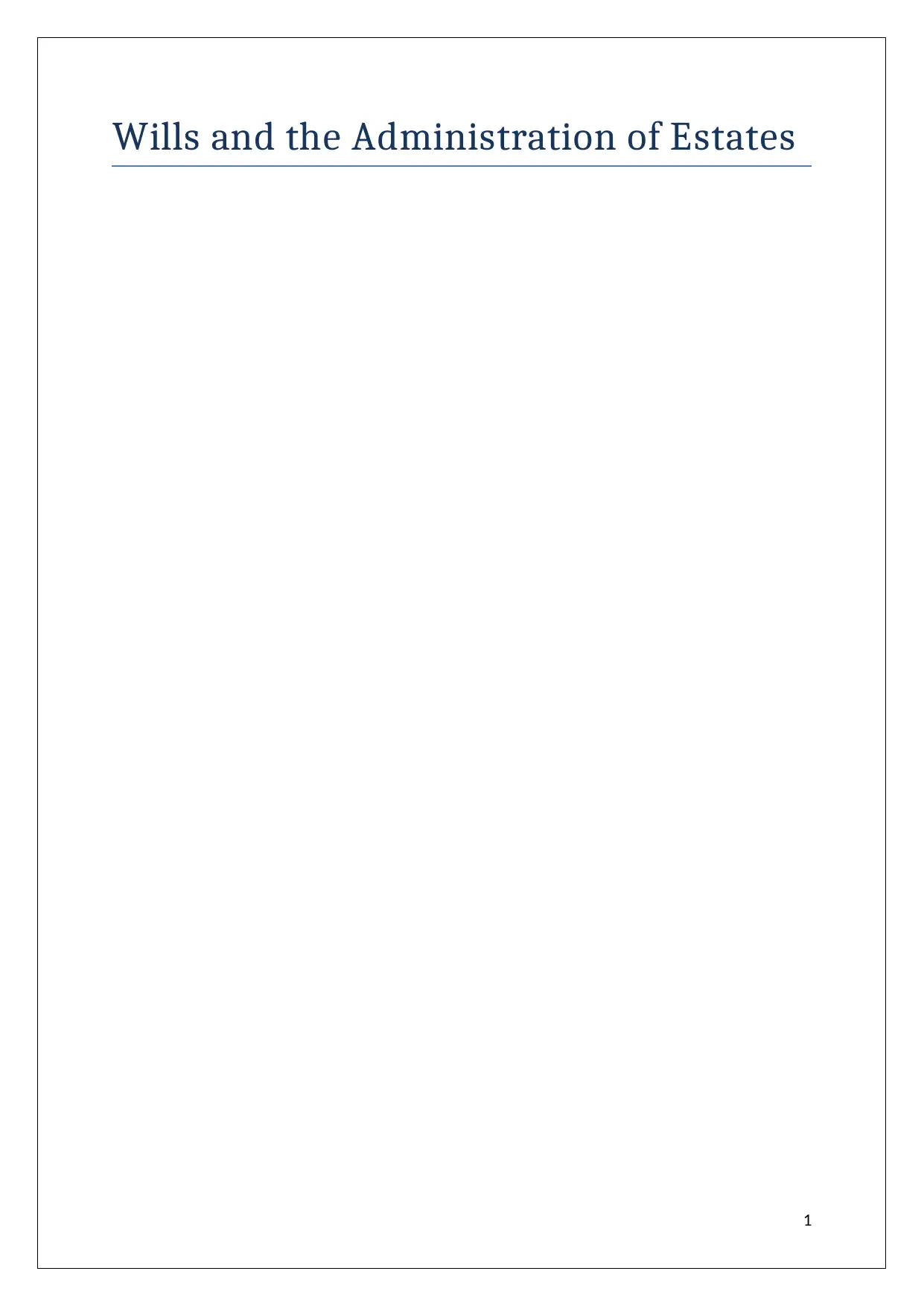
Wills and the Administration of Estates
1
1
Paraphrase This Document
Need a fresh take? Get an instant paraphrase of this document with our AI Paraphraser
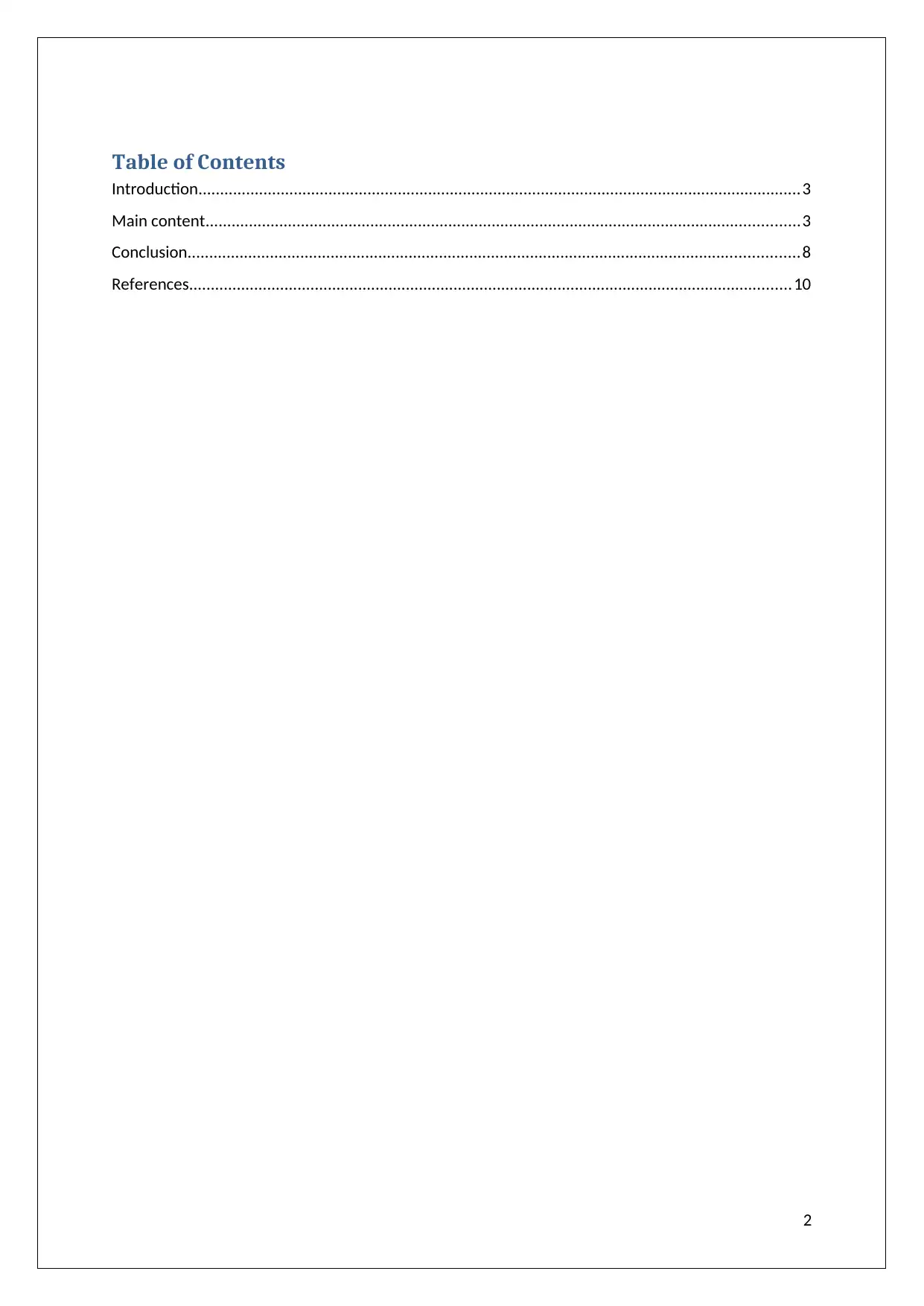
Table of Contents
Introduction...........................................................................................................................................3
Main content.........................................................................................................................................3
Conclusion.............................................................................................................................................8
References...........................................................................................................................................10
2
Introduction...........................................................................................................................................3
Main content.........................................................................................................................................3
Conclusion.............................................................................................................................................8
References...........................................................................................................................................10
2
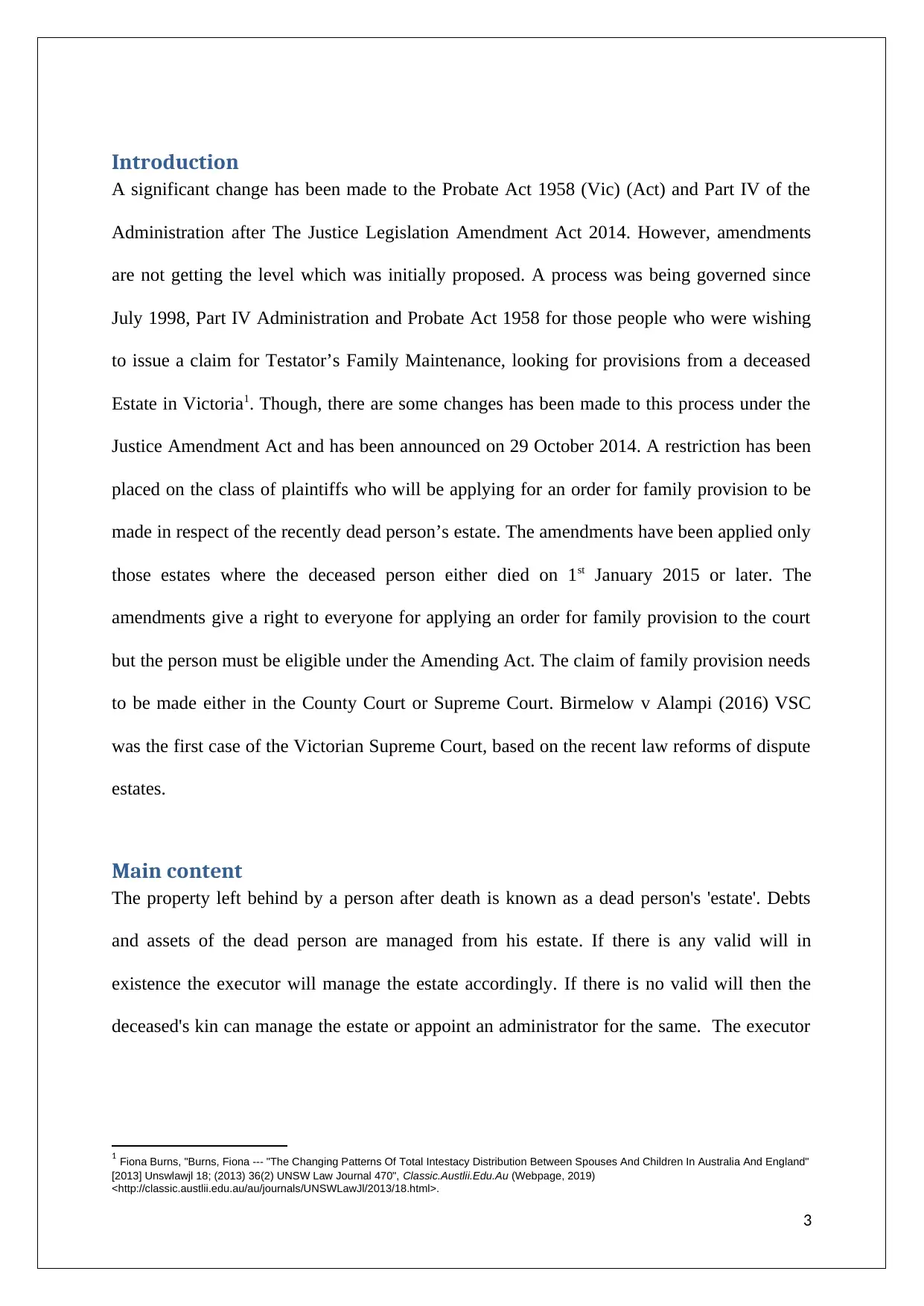
Introduction
A significant change has been made to the Probate Act 1958 (Vic) (Act) and Part IV of the
Administration after The Justice Legislation Amendment Act 2014. However, amendments
are not getting the level which was initially proposed. A process was being governed since
July 1998, Part IV Administration and Probate Act 1958 for those people who were wishing
to issue a claim for Testator’s Family Maintenance, looking for provisions from a deceased
Estate in Victoria1. Though, there are some changes has been made to this process under the
Justice Amendment Act and has been announced on 29 October 2014. A restriction has been
placed on the class of plaintiffs who will be applying for an order for family provision to be
made in respect of the recently dead person’s estate. The amendments have been applied only
those estates where the deceased person either died on 1st January 2015 or later. The
amendments give a right to everyone for applying an order for family provision to the court
but the person must be eligible under the Amending Act. The claim of family provision needs
to be made either in the County Court or Supreme Court. Birmelow v Alampi (2016) VSC
was the first case of the Victorian Supreme Court, based on the recent law reforms of dispute
estates.
Main content
The property left behind by a person after death is known as a dead person's 'estate'. Debts
and assets of the dead person are managed from his estate. If there is any valid will in
existence the executor will manage the estate accordingly. If there is no valid will then the
deceased's kin can manage the estate or appoint an administrator for the same. The executor
1 Fiona Burns, "Burns, Fiona --- "The Changing Patterns Of Total Intestacy Distribution Between Spouses And Children In Australia And England"
[2013] Unswlawjl 18; (2013) 36(2) UNSW Law Journal 470", Classic.Austlii.Edu.Au (Webpage, 2019)
<http://classic.austlii.edu.au/au/journals/UNSWLawJl/2013/18.html>.
3
A significant change has been made to the Probate Act 1958 (Vic) (Act) and Part IV of the
Administration after The Justice Legislation Amendment Act 2014. However, amendments
are not getting the level which was initially proposed. A process was being governed since
July 1998, Part IV Administration and Probate Act 1958 for those people who were wishing
to issue a claim for Testator’s Family Maintenance, looking for provisions from a deceased
Estate in Victoria1. Though, there are some changes has been made to this process under the
Justice Amendment Act and has been announced on 29 October 2014. A restriction has been
placed on the class of plaintiffs who will be applying for an order for family provision to be
made in respect of the recently dead person’s estate. The amendments have been applied only
those estates where the deceased person either died on 1st January 2015 or later. The
amendments give a right to everyone for applying an order for family provision to the court
but the person must be eligible under the Amending Act. The claim of family provision needs
to be made either in the County Court or Supreme Court. Birmelow v Alampi (2016) VSC
was the first case of the Victorian Supreme Court, based on the recent law reforms of dispute
estates.
Main content
The property left behind by a person after death is known as a dead person's 'estate'. Debts
and assets of the dead person are managed from his estate. If there is any valid will in
existence the executor will manage the estate accordingly. If there is no valid will then the
deceased's kin can manage the estate or appoint an administrator for the same. The executor
1 Fiona Burns, "Burns, Fiona --- "The Changing Patterns Of Total Intestacy Distribution Between Spouses And Children In Australia And England"
[2013] Unswlawjl 18; (2013) 36(2) UNSW Law Journal 470", Classic.Austlii.Edu.Au (Webpage, 2019)
<http://classic.austlii.edu.au/au/journals/UNSWLawJl/2013/18.html>.
3
⊘ This is a preview!⊘
Do you want full access?
Subscribe today to unlock all pages.

Trusted by 1+ million students worldwide
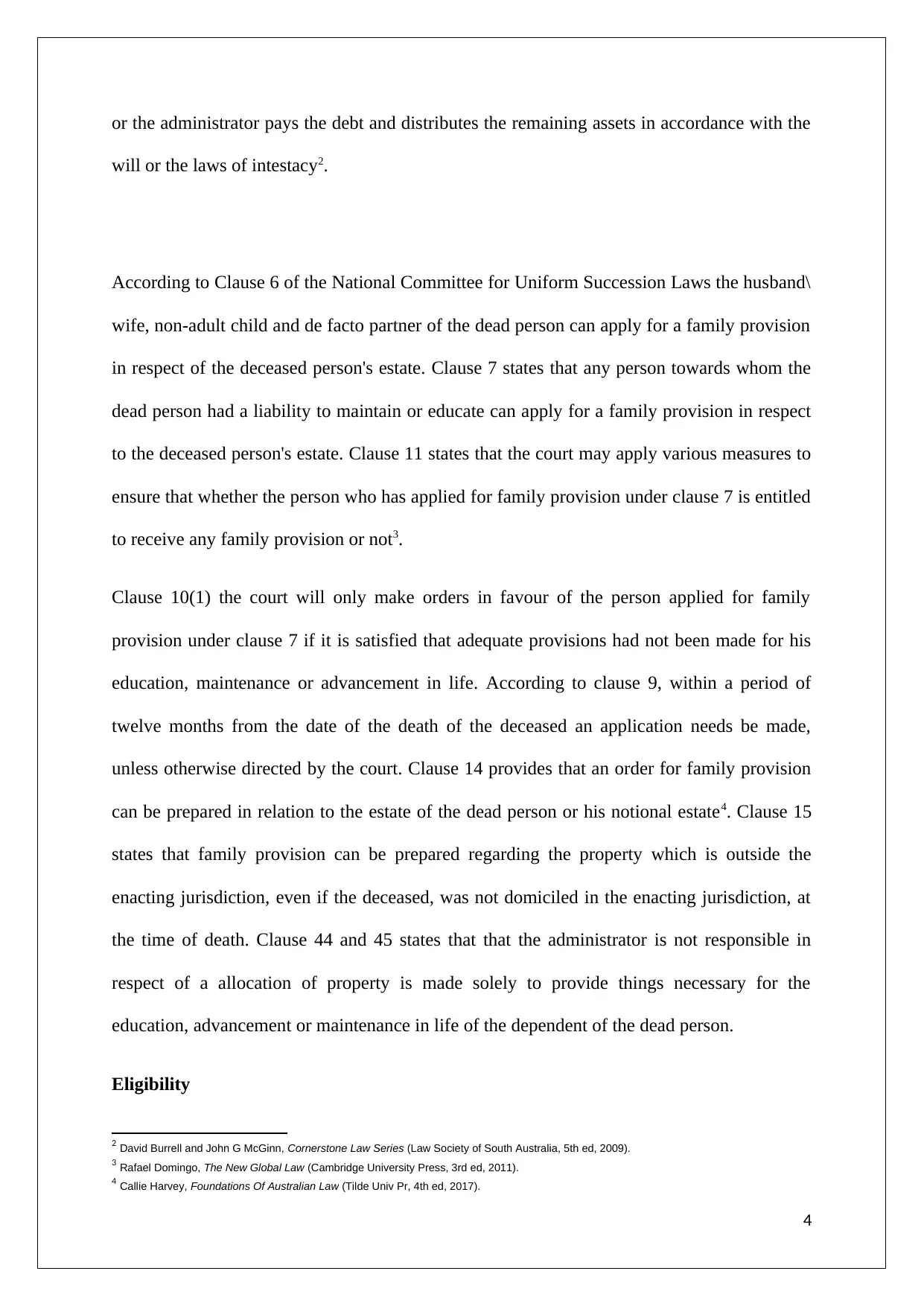
or the administrator pays the debt and distributes the remaining assets in accordance with the
will or the laws of intestacy2.
According to Clause 6 of the National Committee for Uniform Succession Laws the husband\
wife, non-adult child and de facto partner of the dead person can apply for a family provision
in respect of the deceased person's estate. Clause 7 states that any person towards whom the
dead person had a liability to maintain or educate can apply for a family provision in respect
to the deceased person's estate. Clause 11 states that the court may apply various measures to
ensure that whether the person who has applied for family provision under clause 7 is entitled
to receive any family provision or not3.
Clause 10(1) the court will only make orders in favour of the person applied for family
provision under clause 7 if it is satisfied that adequate provisions had not been made for his
education, maintenance or advancement in life. According to clause 9, within a period of
twelve months from the date of the death of the deceased an application needs be made,
unless otherwise directed by the court. Clause 14 provides that an order for family provision
can be prepared in relation to the estate of the dead person or his notional estate4. Clause 15
states that family provision can be prepared regarding the property which is outside the
enacting jurisdiction, even if the deceased, was not domiciled in the enacting jurisdiction, at
the time of death. Clause 44 and 45 states that that the administrator is not responsible in
respect of a allocation of property is made solely to provide things necessary for the
education, advancement or maintenance in life of the dependent of the dead person.
Eligibility
2 David Burrell and John G McGinn, Cornerstone Law Series (Law Society of South Australia, 5th ed, 2009).
3 Rafael Domingo, The New Global Law (Cambridge University Press, 3rd ed, 2011).
4 Callie Harvey, Foundations Of Australian Law (Tilde Univ Pr, 4th ed, 2017).
4
will or the laws of intestacy2.
According to Clause 6 of the National Committee for Uniform Succession Laws the husband\
wife, non-adult child and de facto partner of the dead person can apply for a family provision
in respect of the deceased person's estate. Clause 7 states that any person towards whom the
dead person had a liability to maintain or educate can apply for a family provision in respect
to the deceased person's estate. Clause 11 states that the court may apply various measures to
ensure that whether the person who has applied for family provision under clause 7 is entitled
to receive any family provision or not3.
Clause 10(1) the court will only make orders in favour of the person applied for family
provision under clause 7 if it is satisfied that adequate provisions had not been made for his
education, maintenance or advancement in life. According to clause 9, within a period of
twelve months from the date of the death of the deceased an application needs be made,
unless otherwise directed by the court. Clause 14 provides that an order for family provision
can be prepared in relation to the estate of the dead person or his notional estate4. Clause 15
states that family provision can be prepared regarding the property which is outside the
enacting jurisdiction, even if the deceased, was not domiciled in the enacting jurisdiction, at
the time of death. Clause 44 and 45 states that that the administrator is not responsible in
respect of a allocation of property is made solely to provide things necessary for the
education, advancement or maintenance in life of the dependent of the dead person.
Eligibility
2 David Burrell and John G McGinn, Cornerstone Law Series (Law Society of South Australia, 5th ed, 2009).
3 Rafael Domingo, The New Global Law (Cambridge University Press, 3rd ed, 2011).
4 Callie Harvey, Foundations Of Australian Law (Tilde Univ Pr, 4th ed, 2017).
4
Paraphrase This Document
Need a fresh take? Get an instant paraphrase of this document with our AI Paraphraser
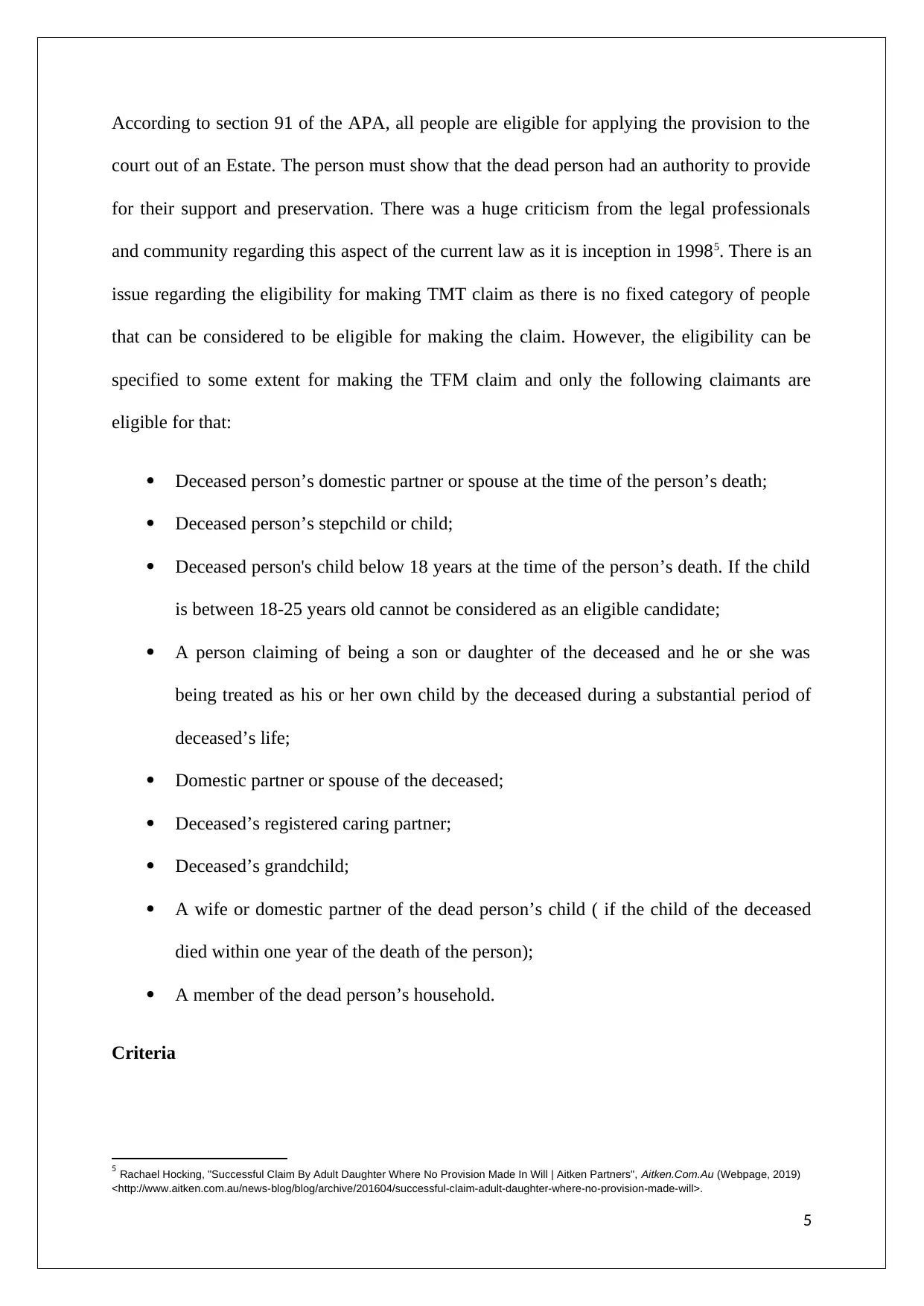
According to section 91 of the APA, all people are eligible for applying the provision to the
court out of an Estate. The person must show that the dead person had an authority to provide
for their support and preservation. There was a huge criticism from the legal professionals
and community regarding this aspect of the current law as it is inception in 19985. There is an
issue regarding the eligibility for making TMT claim as there is no fixed category of people
that can be considered to be eligible for making the claim. However, the eligibility can be
specified to some extent for making the TFM claim and only the following claimants are
eligible for that:
Deceased person’s domestic partner or spouse at the time of the person’s death;
Deceased person’s stepchild or child;
Deceased person's child below 18 years at the time of the person’s death. If the child
is between 18-25 years old cannot be considered as an eligible candidate;
A person claiming of being a son or daughter of the deceased and he or she was
being treated as his or her own child by the deceased during a substantial period of
deceased’s life;
Domestic partner or spouse of the deceased;
Deceased’s registered caring partner;
Deceased’s grandchild;
A wife or domestic partner of the dead person’s child ( if the child of the deceased
died within one year of the death of the person);
A member of the dead person’s household.
Criteria
5 Rachael Hocking, "Successful Claim By Adult Daughter Where No Provision Made In Will | Aitken Partners", Aitken.Com.Au (Webpage, 2019)
<http://www.aitken.com.au/news-blog/blog/archive/201604/successful-claim-adult-daughter-where-no-provision-made-will>.
5
court out of an Estate. The person must show that the dead person had an authority to provide
for their support and preservation. There was a huge criticism from the legal professionals
and community regarding this aspect of the current law as it is inception in 19985. There is an
issue regarding the eligibility for making TMT claim as there is no fixed category of people
that can be considered to be eligible for making the claim. However, the eligibility can be
specified to some extent for making the TFM claim and only the following claimants are
eligible for that:
Deceased person’s domestic partner or spouse at the time of the person’s death;
Deceased person’s stepchild or child;
Deceased person's child below 18 years at the time of the person’s death. If the child
is between 18-25 years old cannot be considered as an eligible candidate;
A person claiming of being a son or daughter of the deceased and he or she was
being treated as his or her own child by the deceased during a substantial period of
deceased’s life;
Domestic partner or spouse of the deceased;
Deceased’s registered caring partner;
Deceased’s grandchild;
A wife or domestic partner of the dead person’s child ( if the child of the deceased
died within one year of the death of the person);
A member of the dead person’s household.
Criteria
5 Rachael Hocking, "Successful Claim By Adult Daughter Where No Provision Made In Will | Aitken Partners", Aitken.Com.Au (Webpage, 2019)
<http://www.aitken.com.au/news-blog/blog/archive/201604/successful-claim-adult-daughter-where-no-provision-made-will>.
5
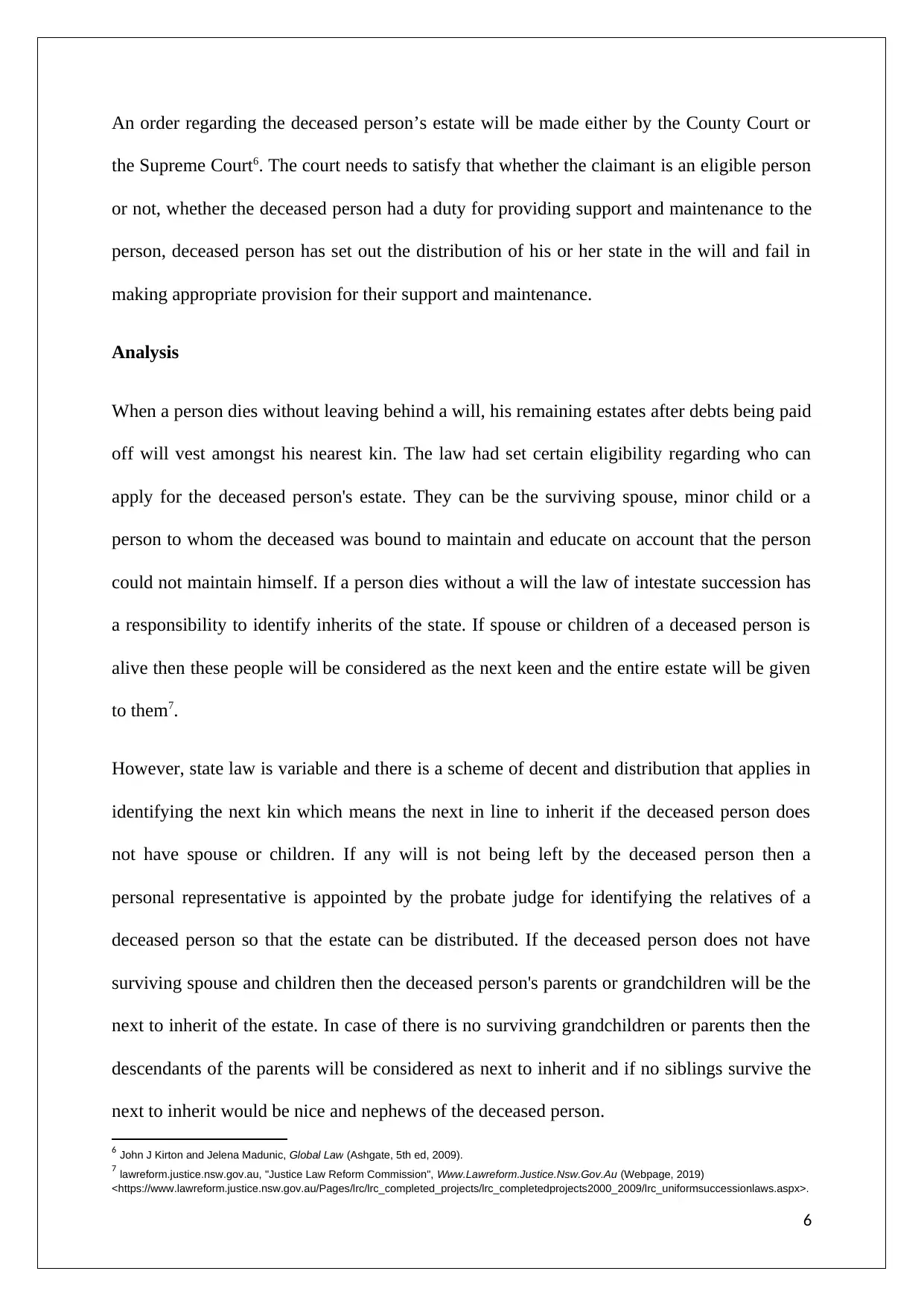
An order regarding the deceased person’s estate will be made either by the County Court or
the Supreme Court6. The court needs to satisfy that whether the claimant is an eligible person
or not, whether the deceased person had a duty for providing support and maintenance to the
person, deceased person has set out the distribution of his or her state in the will and fail in
making appropriate provision for their support and maintenance.
Analysis
When a person dies without leaving behind a will, his remaining estates after debts being paid
off will vest amongst his nearest kin. The law had set certain eligibility regarding who can
apply for the deceased person's estate. They can be the surviving spouse, minor child or a
person to whom the deceased was bound to maintain and educate on account that the person
could not maintain himself. If a person dies without a will the law of intestate succession has
a responsibility to identify inherits of the state. If spouse or children of a deceased person is
alive then these people will be considered as the next keen and the entire estate will be given
to them7.
However, state law is variable and there is a scheme of decent and distribution that applies in
identifying the next kin which means the next in line to inherit if the deceased person does
not have spouse or children. If any will is not being left by the deceased person then a
personal representative is appointed by the probate judge for identifying the relatives of a
deceased person so that the estate can be distributed. If the deceased person does not have
surviving spouse and children then the deceased person's parents or grandchildren will be the
next to inherit of the estate. In case of there is no surviving grandchildren or parents then the
descendants of the parents will be considered as next to inherit and if no siblings survive the
next to inherit would be nice and nephews of the deceased person.
6 John J Kirton and Jelena Madunic, Global Law (Ashgate, 5th ed, 2009).
7 lawreform.justice.nsw.gov.au, "Justice Law Reform Commission", Www.Lawreform.Justice.Nsw.Gov.Au (Webpage, 2019)
<https://www.lawreform.justice.nsw.gov.au/Pages/lrc/lrc_completed_projects/lrc_completedprojects2000_2009/lrc_uniformsuccessionlaws.aspx>.
6
the Supreme Court6. The court needs to satisfy that whether the claimant is an eligible person
or not, whether the deceased person had a duty for providing support and maintenance to the
person, deceased person has set out the distribution of his or her state in the will and fail in
making appropriate provision for their support and maintenance.
Analysis
When a person dies without leaving behind a will, his remaining estates after debts being paid
off will vest amongst his nearest kin. The law had set certain eligibility regarding who can
apply for the deceased person's estate. They can be the surviving spouse, minor child or a
person to whom the deceased was bound to maintain and educate on account that the person
could not maintain himself. If a person dies without a will the law of intestate succession has
a responsibility to identify inherits of the state. If spouse or children of a deceased person is
alive then these people will be considered as the next keen and the entire estate will be given
to them7.
However, state law is variable and there is a scheme of decent and distribution that applies in
identifying the next kin which means the next in line to inherit if the deceased person does
not have spouse or children. If any will is not being left by the deceased person then a
personal representative is appointed by the probate judge for identifying the relatives of a
deceased person so that the estate can be distributed. If the deceased person does not have
surviving spouse and children then the deceased person's parents or grandchildren will be the
next to inherit of the estate. In case of there is no surviving grandchildren or parents then the
descendants of the parents will be considered as next to inherit and if no siblings survive the
next to inherit would be nice and nephews of the deceased person.
6 John J Kirton and Jelena Madunic, Global Law (Ashgate, 5th ed, 2009).
7 lawreform.justice.nsw.gov.au, "Justice Law Reform Commission", Www.Lawreform.Justice.Nsw.Gov.Au (Webpage, 2019)
<https://www.lawreform.justice.nsw.gov.au/Pages/lrc/lrc_completed_projects/lrc_completedprojects2000_2009/lrc_uniformsuccessionlaws.aspx>.
6
⊘ This is a preview!⊘
Do you want full access?
Subscribe today to unlock all pages.

Trusted by 1+ million students worldwide
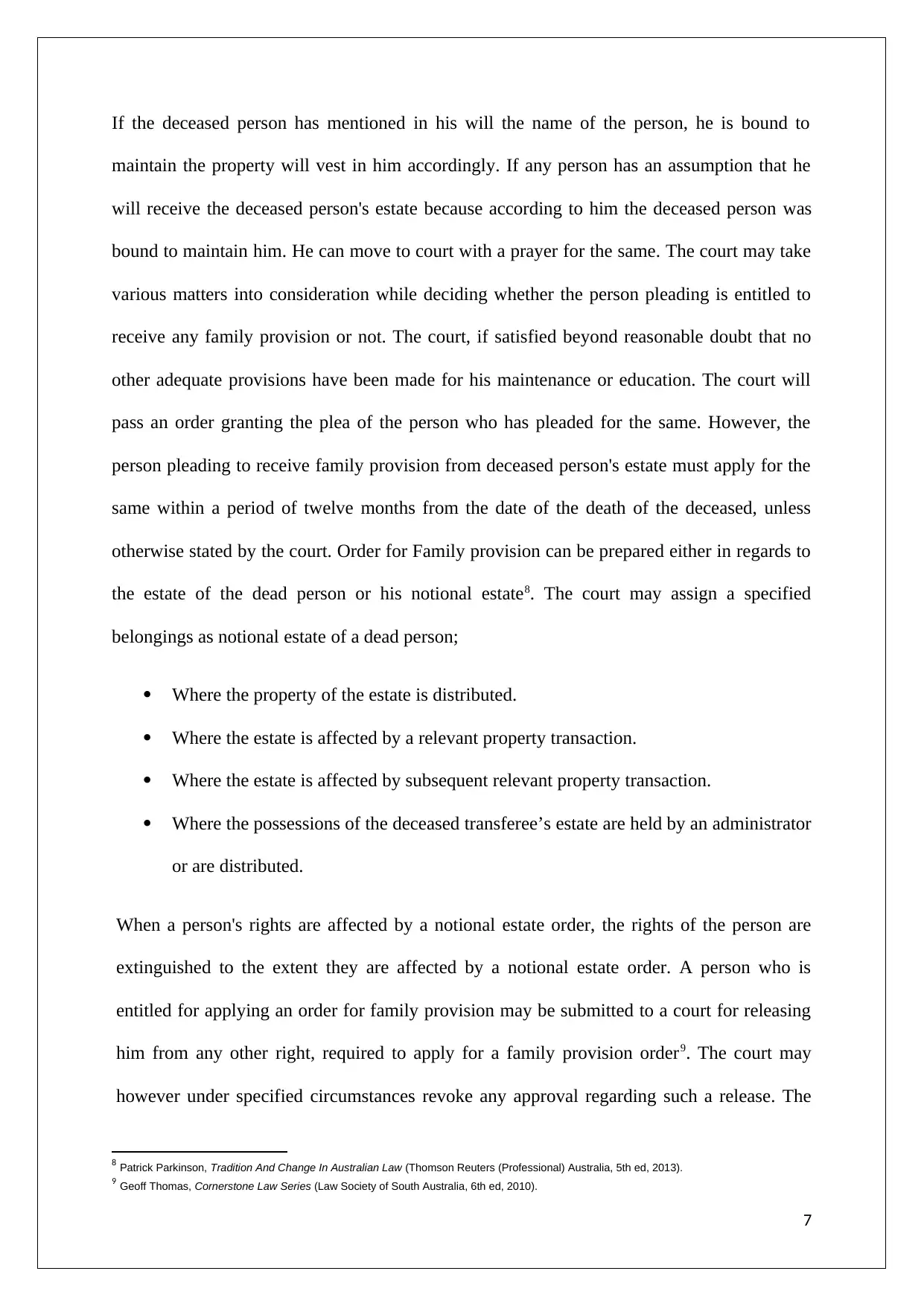
If the deceased person has mentioned in his will the name of the person, he is bound to
maintain the property will vest in him accordingly. If any person has an assumption that he
will receive the deceased person's estate because according to him the deceased person was
bound to maintain him. He can move to court with a prayer for the same. The court may take
various matters into consideration while deciding whether the person pleading is entitled to
receive any family provision or not. The court, if satisfied beyond reasonable doubt that no
other adequate provisions have been made for his maintenance or education. The court will
pass an order granting the plea of the person who has pleaded for the same. However, the
person pleading to receive family provision from deceased person's estate must apply for the
same within a period of twelve months from the date of the death of the deceased, unless
otherwise stated by the court. Order for Family provision can be prepared either in regards to
the estate of the dead person or his notional estate8. The court may assign a specified
belongings as notional estate of a dead person;
Where the property of the estate is distributed.
Where the estate is affected by a relevant property transaction.
Where the estate is affected by subsequent relevant property transaction.
Where the possessions of the deceased transferee’s estate are held by an administrator
or are distributed.
When a person's rights are affected by a notional estate order, the rights of the person are
extinguished to the extent they are affected by a notional estate order. A person who is
entitled for applying an order for family provision may be submitted to a court for releasing
him from any other right, required to apply for a family provision order9. The court may
however under specified circumstances revoke any approval regarding such a release. The
8 Patrick Parkinson, Tradition And Change In Australian Law (Thomson Reuters (Professional) Australia, 5th ed, 2013).
9 Geoff Thomas, Cornerstone Law Series (Law Society of South Australia, 6th ed, 2010).
7
maintain the property will vest in him accordingly. If any person has an assumption that he
will receive the deceased person's estate because according to him the deceased person was
bound to maintain him. He can move to court with a prayer for the same. The court may take
various matters into consideration while deciding whether the person pleading is entitled to
receive any family provision or not. The court, if satisfied beyond reasonable doubt that no
other adequate provisions have been made for his maintenance or education. The court will
pass an order granting the plea of the person who has pleaded for the same. However, the
person pleading to receive family provision from deceased person's estate must apply for the
same within a period of twelve months from the date of the death of the deceased, unless
otherwise stated by the court. Order for Family provision can be prepared either in regards to
the estate of the dead person or his notional estate8. The court may assign a specified
belongings as notional estate of a dead person;
Where the property of the estate is distributed.
Where the estate is affected by a relevant property transaction.
Where the estate is affected by subsequent relevant property transaction.
Where the possessions of the deceased transferee’s estate are held by an administrator
or are distributed.
When a person's rights are affected by a notional estate order, the rights of the person are
extinguished to the extent they are affected by a notional estate order. A person who is
entitled for applying an order for family provision may be submitted to a court for releasing
him from any other right, required to apply for a family provision order9. The court may
however under specified circumstances revoke any approval regarding such a release. The
8 Patrick Parkinson, Tradition And Change In Australian Law (Thomson Reuters (Professional) Australia, 5th ed, 2013).
9 Geoff Thomas, Cornerstone Law Series (Law Society of South Australia, 6th ed, 2010).
7
Paraphrase This Document
Need a fresh take? Get an instant paraphrase of this document with our AI Paraphraser
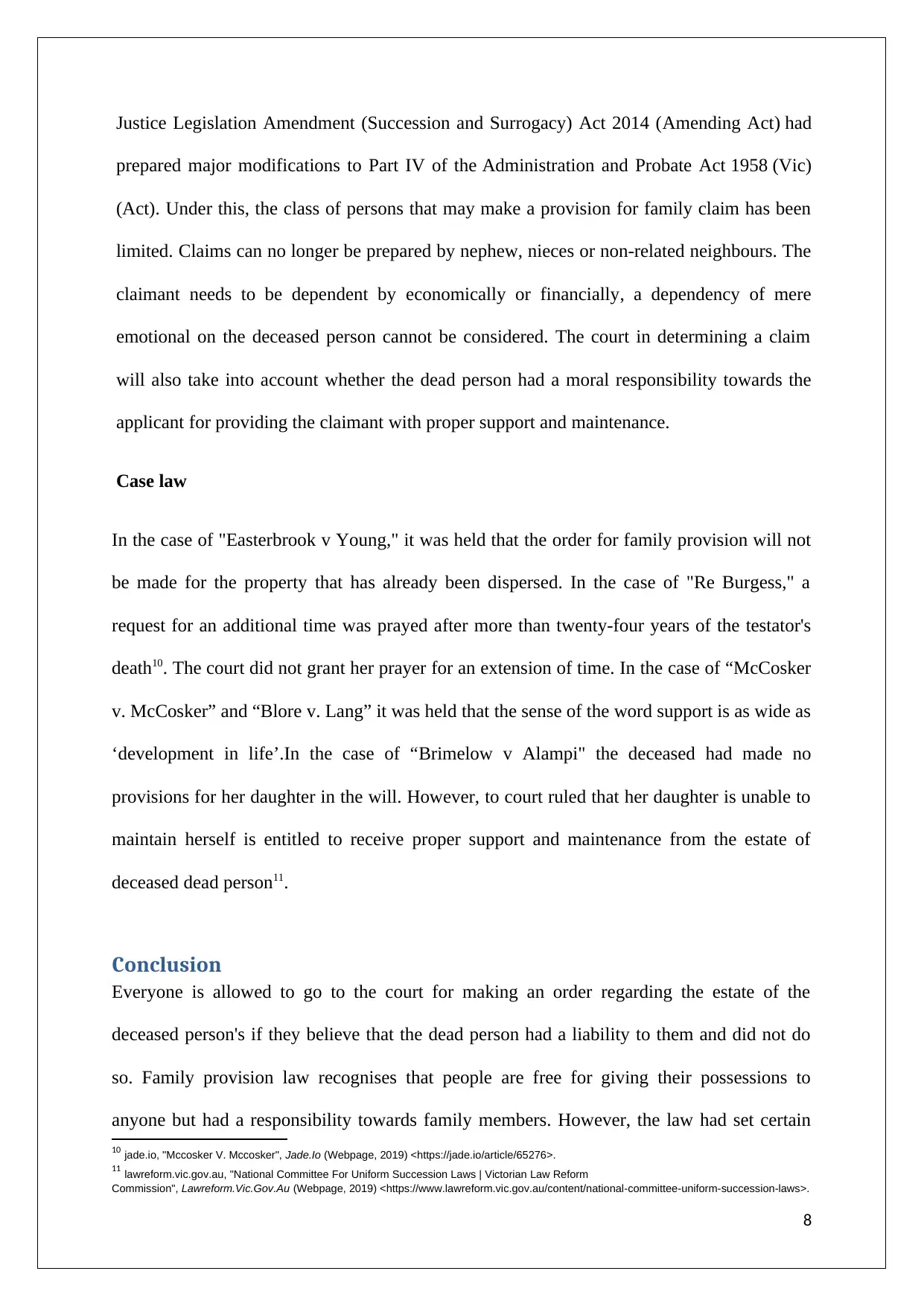
Justice Legislation Amendment (Succession and Surrogacy) Act 2014 (Amending Act) had
prepared major modifications to Part IV of the Administration and Probate Act 1958 (Vic)
(Act). Under this, the class of persons that may make a provision for family claim has been
limited. Claims can no longer be prepared by nephew, nieces or non-related neighbours. The
claimant needs to be dependent by economically or financially, a dependency of mere
emotional on the deceased person cannot be considered. The court in determining a claim
will also take into account whether the dead person had a moral responsibility towards the
applicant for providing the claimant with proper support and maintenance.
Case law
In the case of "Easterbrook v Young," it was held that the order for family provision will not
be made for the property that has already been dispersed. In the case of "Re Burgess," a
request for an additional time was prayed after more than twenty-four years of the testator's
death10. The court did not grant her prayer for an extension of time. In the case of “McCosker
v. McCosker” and “Blore v. Lang” it was held that the sense of the word support is as wide as
‘development in life’.In the case of “Brimelow v Alampi" the deceased had made no
provisions for her daughter in the will. However, to court ruled that her daughter is unable to
maintain herself is entitled to receive proper support and maintenance from the estate of
deceased dead person11.
Conclusion
Everyone is allowed to go to the court for making an order regarding the estate of the
deceased person's if they believe that the dead person had a liability to them and did not do
so. Family provision law recognises that people are free for giving their possessions to
anyone but had a responsibility towards family members. However, the law had set certain
10 jade.io, "Mccosker V. Mccosker", Jade.Io (Webpage, 2019) <https://jade.io/article/65276>.
11 lawreform.vic.gov.au, "National Committee For Uniform Succession Laws | Victorian Law Reform
Commission", Lawreform.Vic.Gov.Au (Webpage, 2019) <https://www.lawreform.vic.gov.au/content/national-committee-uniform-succession-laws>.
8
prepared major modifications to Part IV of the Administration and Probate Act 1958 (Vic)
(Act). Under this, the class of persons that may make a provision for family claim has been
limited. Claims can no longer be prepared by nephew, nieces or non-related neighbours. The
claimant needs to be dependent by economically or financially, a dependency of mere
emotional on the deceased person cannot be considered. The court in determining a claim
will also take into account whether the dead person had a moral responsibility towards the
applicant for providing the claimant with proper support and maintenance.
Case law
In the case of "Easterbrook v Young," it was held that the order for family provision will not
be made for the property that has already been dispersed. In the case of "Re Burgess," a
request for an additional time was prayed after more than twenty-four years of the testator's
death10. The court did not grant her prayer for an extension of time. In the case of “McCosker
v. McCosker” and “Blore v. Lang” it was held that the sense of the word support is as wide as
‘development in life’.In the case of “Brimelow v Alampi" the deceased had made no
provisions for her daughter in the will. However, to court ruled that her daughter is unable to
maintain herself is entitled to receive proper support and maintenance from the estate of
deceased dead person11.
Conclusion
Everyone is allowed to go to the court for making an order regarding the estate of the
deceased person's if they believe that the dead person had a liability to them and did not do
so. Family provision law recognises that people are free for giving their possessions to
anyone but had a responsibility towards family members. However, the law had set certain
10 jade.io, "Mccosker V. Mccosker", Jade.Io (Webpage, 2019) <https://jade.io/article/65276>.
11 lawreform.vic.gov.au, "National Committee For Uniform Succession Laws | Victorian Law Reform
Commission", Lawreform.Vic.Gov.Au (Webpage, 2019) <https://www.lawreform.vic.gov.au/content/national-committee-uniform-succession-laws>.
8
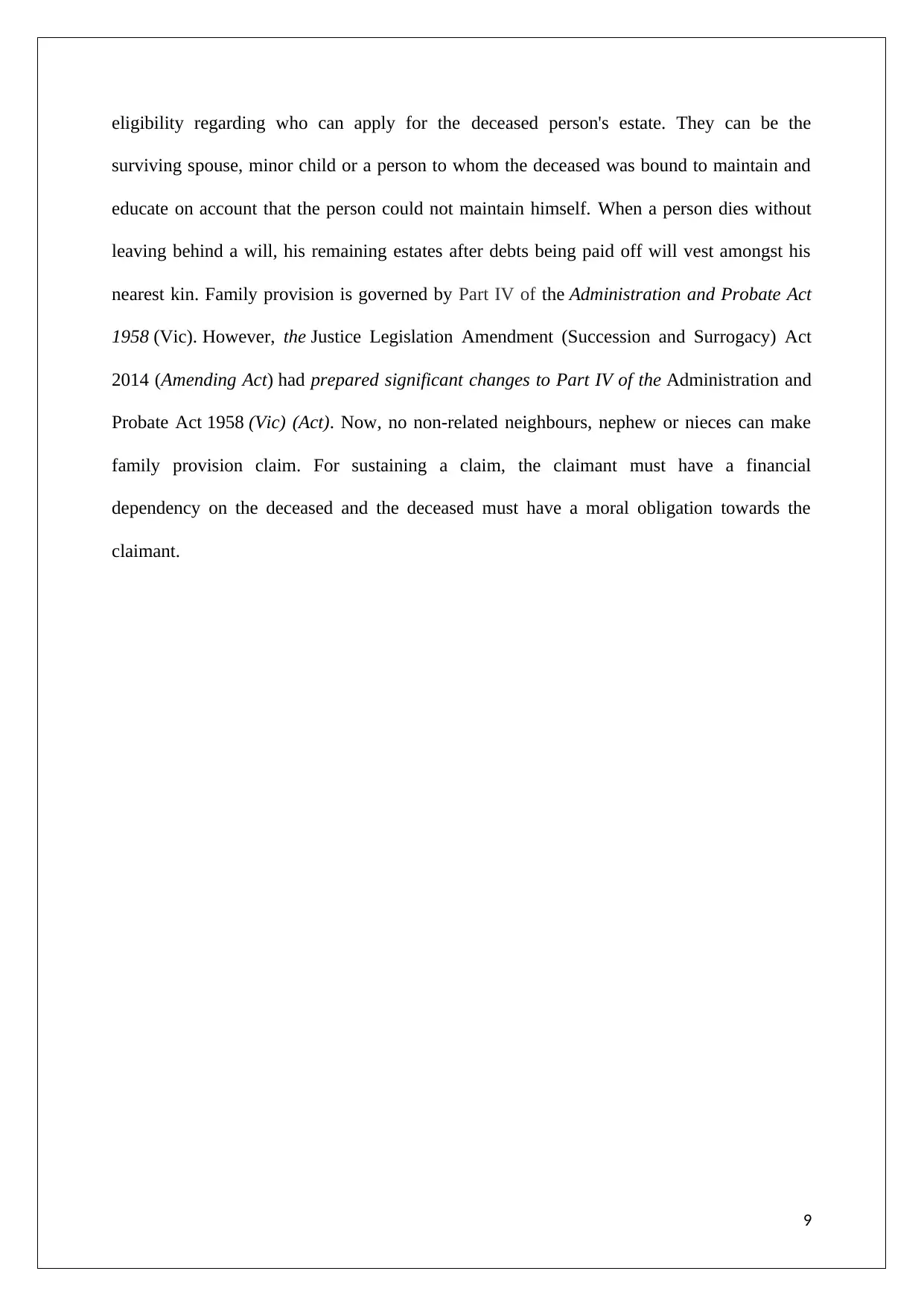
eligibility regarding who can apply for the deceased person's estate. They can be the
surviving spouse, minor child or a person to whom the deceased was bound to maintain and
educate on account that the person could not maintain himself. When a person dies without
leaving behind a will, his remaining estates after debts being paid off will vest amongst his
nearest kin. Family provision is governed by Part IV of the Administration and Probate Act
1958 (Vic). However, the Justice Legislation Amendment (Succession and Surrogacy) Act
2014 (Amending Act) had prepared significant changes to Part IV of the Administration and
Probate Act 1958 (Vic) (Act). Now, no non-related neighbours, nephew or nieces can make
family provision claim. For sustaining a claim, the claimant must have a financial
dependency on the deceased and the deceased must have a moral obligation towards the
claimant.
9
surviving spouse, minor child or a person to whom the deceased was bound to maintain and
educate on account that the person could not maintain himself. When a person dies without
leaving behind a will, his remaining estates after debts being paid off will vest amongst his
nearest kin. Family provision is governed by Part IV of the Administration and Probate Act
1958 (Vic). However, the Justice Legislation Amendment (Succession and Surrogacy) Act
2014 (Amending Act) had prepared significant changes to Part IV of the Administration and
Probate Act 1958 (Vic) (Act). Now, no non-related neighbours, nephew or nieces can make
family provision claim. For sustaining a claim, the claimant must have a financial
dependency on the deceased and the deceased must have a moral obligation towards the
claimant.
9
⊘ This is a preview!⊘
Do you want full access?
Subscribe today to unlock all pages.

Trusted by 1+ million students worldwide
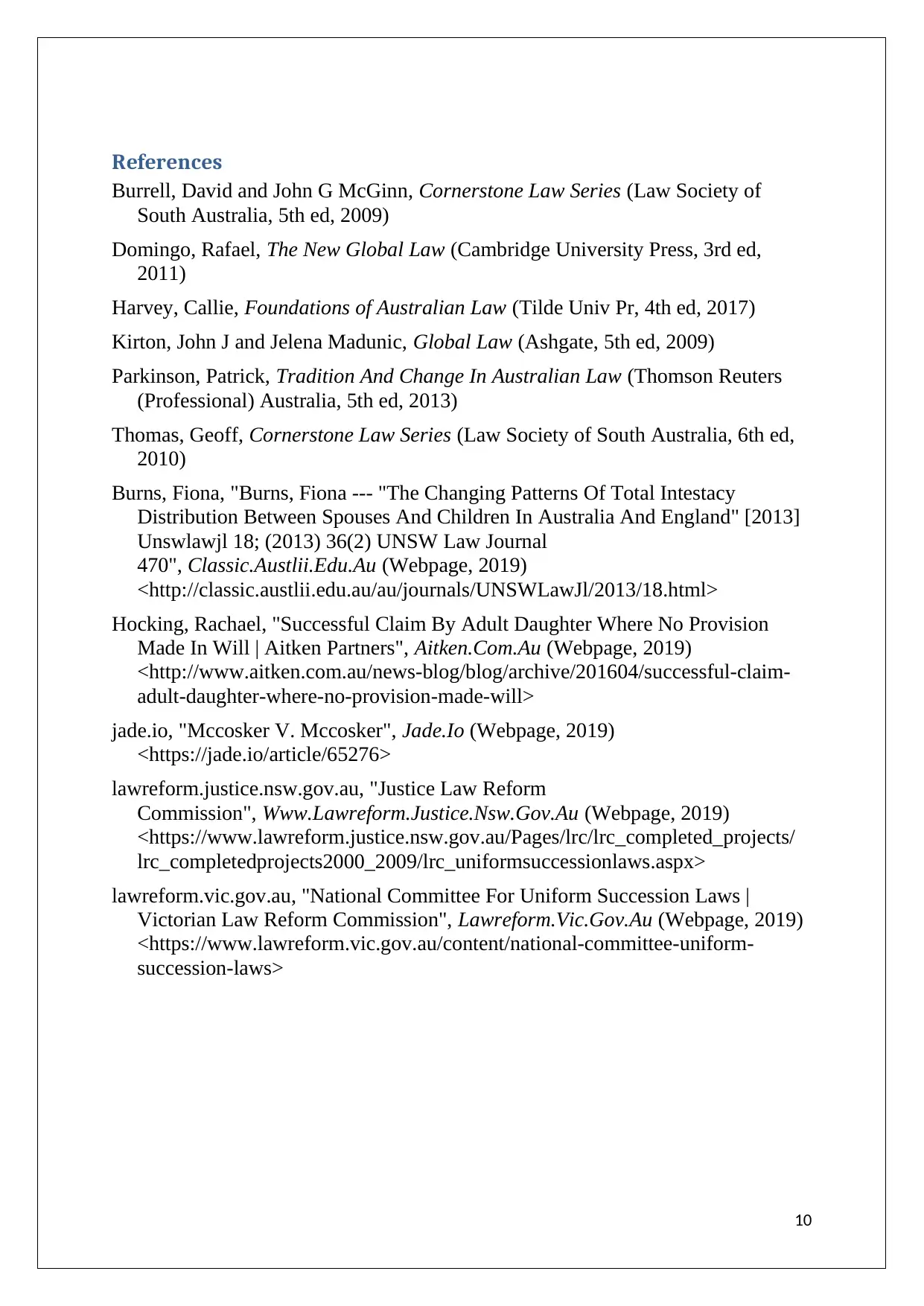
References
Burrell, David and John G McGinn, Cornerstone Law Series (Law Society of
South Australia, 5th ed, 2009)
Domingo, Rafael, The New Global Law (Cambridge University Press, 3rd ed,
2011)
Harvey, Callie, Foundations of Australian Law (Tilde Univ Pr, 4th ed, 2017)
Kirton, John J and Jelena Madunic, Global Law (Ashgate, 5th ed, 2009)
Parkinson, Patrick, Tradition And Change In Australian Law (Thomson Reuters
(Professional) Australia, 5th ed, 2013)
Thomas, Geoff, Cornerstone Law Series (Law Society of South Australia, 6th ed,
2010)
Burns, Fiona, "Burns, Fiona --- "The Changing Patterns Of Total Intestacy
Distribution Between Spouses And Children In Australia And England" [2013]
Unswlawjl 18; (2013) 36(2) UNSW Law Journal
470", Classic.Austlii.Edu.Au (Webpage, 2019)
<http://classic.austlii.edu.au/au/journals/UNSWLawJl/2013/18.html>
Hocking, Rachael, "Successful Claim By Adult Daughter Where No Provision
Made In Will | Aitken Partners", Aitken.Com.Au (Webpage, 2019)
<http://www.aitken.com.au/news-blog/blog/archive/201604/successful-claim-
adult-daughter-where-no-provision-made-will>
jade.io, "Mccosker V. Mccosker", Jade.Io (Webpage, 2019)
<https://jade.io/article/65276>
lawreform.justice.nsw.gov.au, "Justice Law Reform
Commission", Www.Lawreform.Justice.Nsw.Gov.Au (Webpage, 2019)
<https://www.lawreform.justice.nsw.gov.au/Pages/lrc/lrc_completed_projects/
lrc_completedprojects2000_2009/lrc_uniformsuccessionlaws.aspx>
lawreform.vic.gov.au, "National Committee For Uniform Succession Laws |
Victorian Law Reform Commission", Lawreform.Vic.Gov.Au (Webpage, 2019)
<https://www.lawreform.vic.gov.au/content/national-committee-uniform-
succession-laws>
10
Burrell, David and John G McGinn, Cornerstone Law Series (Law Society of
South Australia, 5th ed, 2009)
Domingo, Rafael, The New Global Law (Cambridge University Press, 3rd ed,
2011)
Harvey, Callie, Foundations of Australian Law (Tilde Univ Pr, 4th ed, 2017)
Kirton, John J and Jelena Madunic, Global Law (Ashgate, 5th ed, 2009)
Parkinson, Patrick, Tradition And Change In Australian Law (Thomson Reuters
(Professional) Australia, 5th ed, 2013)
Thomas, Geoff, Cornerstone Law Series (Law Society of South Australia, 6th ed,
2010)
Burns, Fiona, "Burns, Fiona --- "The Changing Patterns Of Total Intestacy
Distribution Between Spouses And Children In Australia And England" [2013]
Unswlawjl 18; (2013) 36(2) UNSW Law Journal
470", Classic.Austlii.Edu.Au (Webpage, 2019)
<http://classic.austlii.edu.au/au/journals/UNSWLawJl/2013/18.html>
Hocking, Rachael, "Successful Claim By Adult Daughter Where No Provision
Made In Will | Aitken Partners", Aitken.Com.Au (Webpage, 2019)
<http://www.aitken.com.au/news-blog/blog/archive/201604/successful-claim-
adult-daughter-where-no-provision-made-will>
jade.io, "Mccosker V. Mccosker", Jade.Io (Webpage, 2019)
<https://jade.io/article/65276>
lawreform.justice.nsw.gov.au, "Justice Law Reform
Commission", Www.Lawreform.Justice.Nsw.Gov.Au (Webpage, 2019)
<https://www.lawreform.justice.nsw.gov.au/Pages/lrc/lrc_completed_projects/
lrc_completedprojects2000_2009/lrc_uniformsuccessionlaws.aspx>
lawreform.vic.gov.au, "National Committee For Uniform Succession Laws |
Victorian Law Reform Commission", Lawreform.Vic.Gov.Au (Webpage, 2019)
<https://www.lawreform.vic.gov.au/content/national-committee-uniform-
succession-laws>
10
1 out of 10
Related Documents
Your All-in-One AI-Powered Toolkit for Academic Success.
+13062052269
info@desklib.com
Available 24*7 on WhatsApp / Email
![[object Object]](/_next/static/media/star-bottom.7253800d.svg)
Unlock your academic potential
Copyright © 2020–2026 A2Z Services. All Rights Reserved. Developed and managed by ZUCOL.





